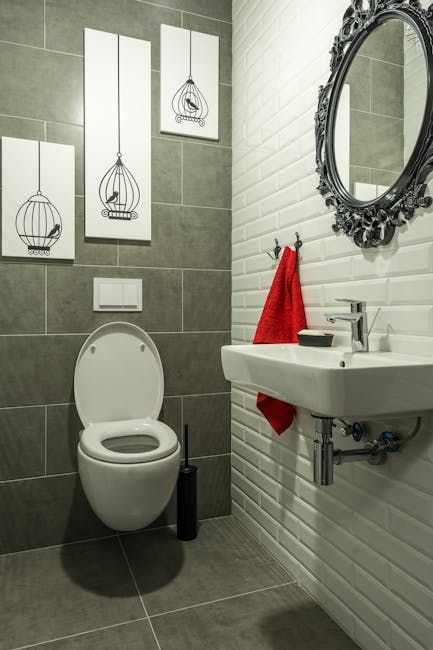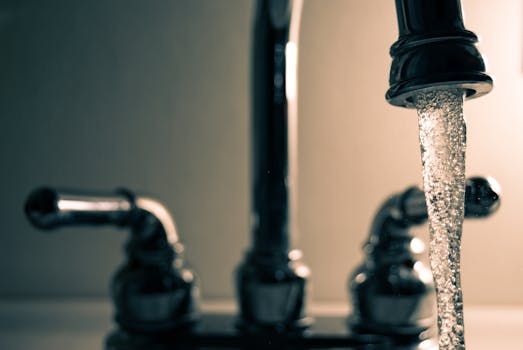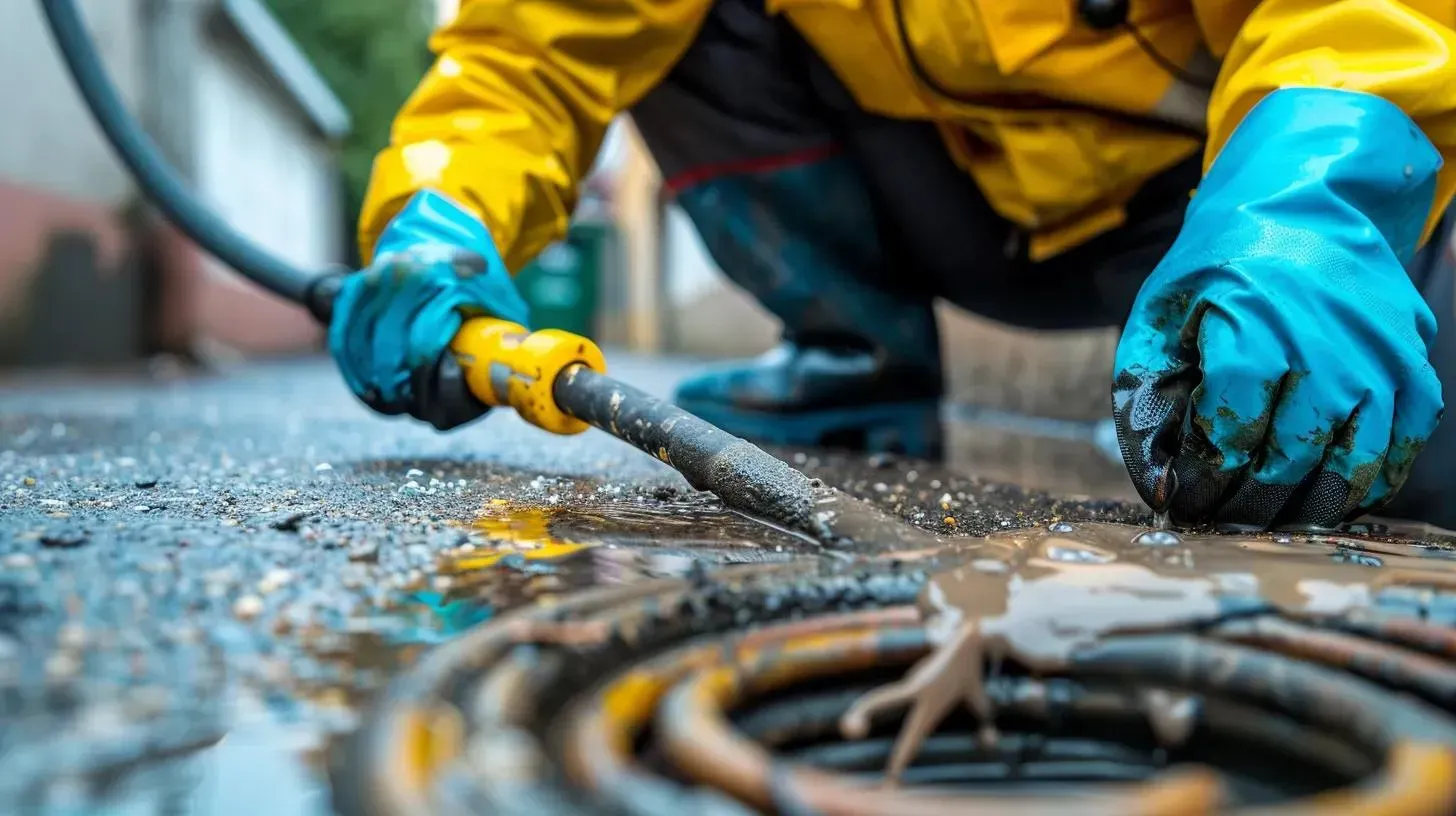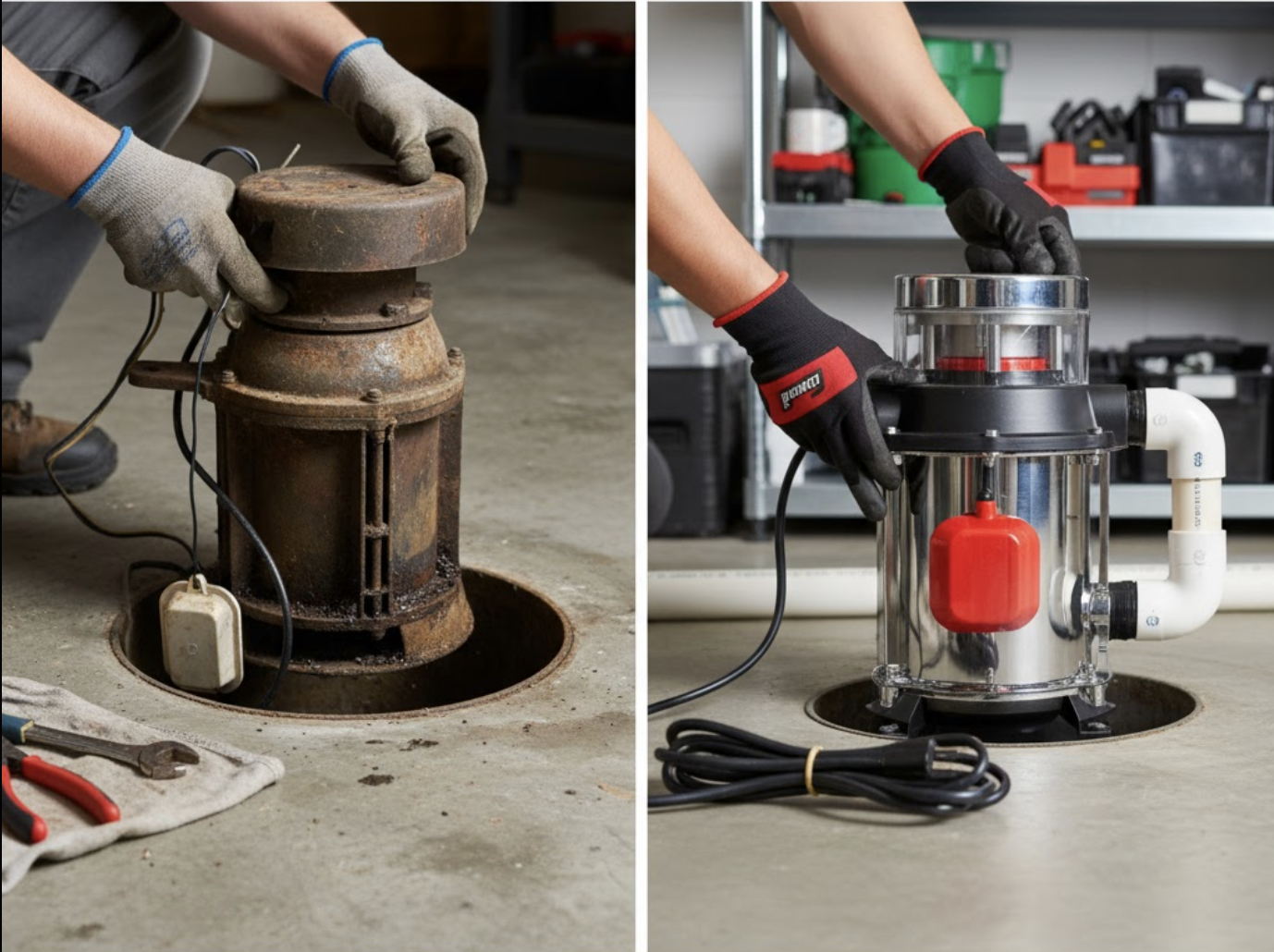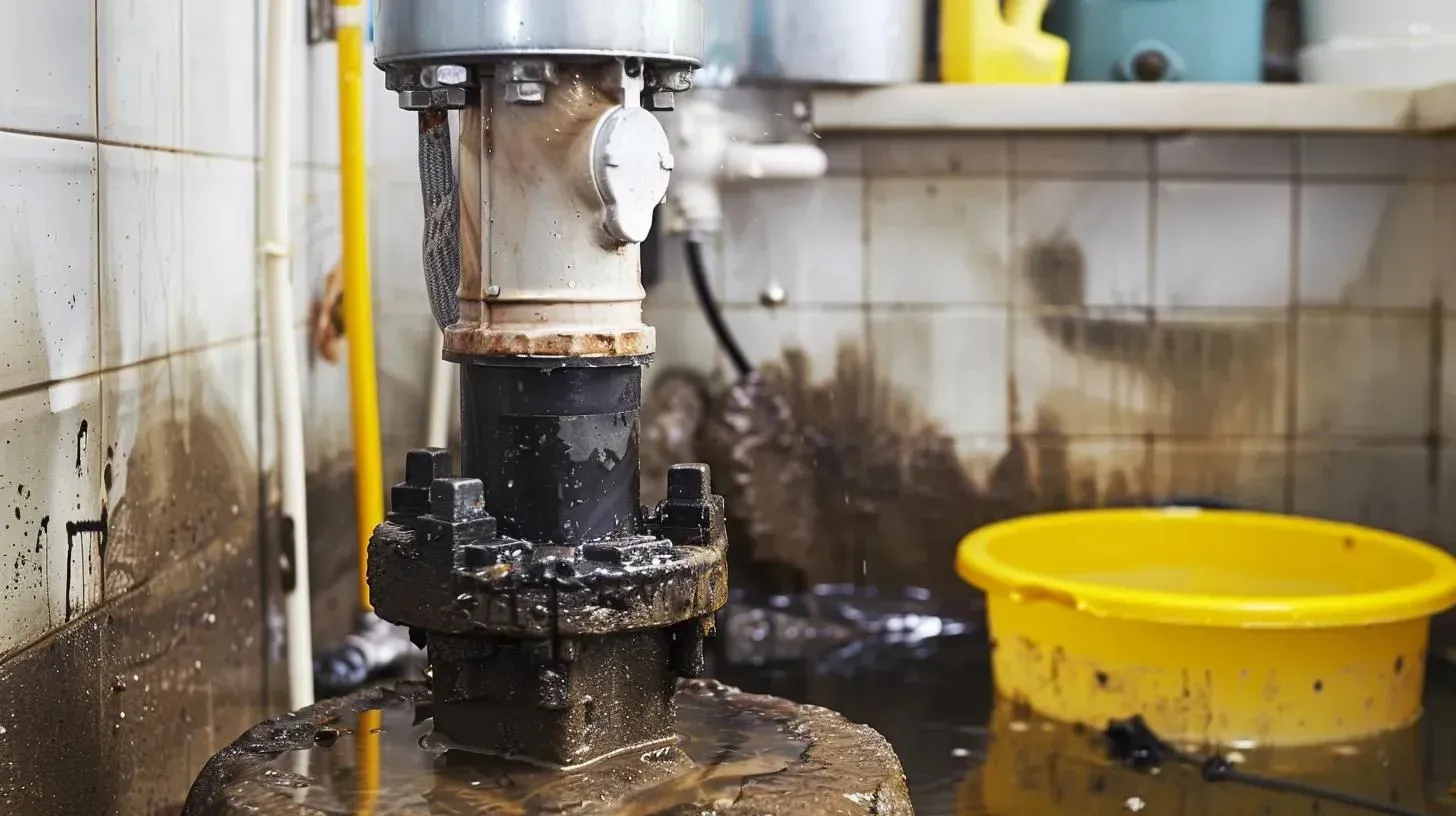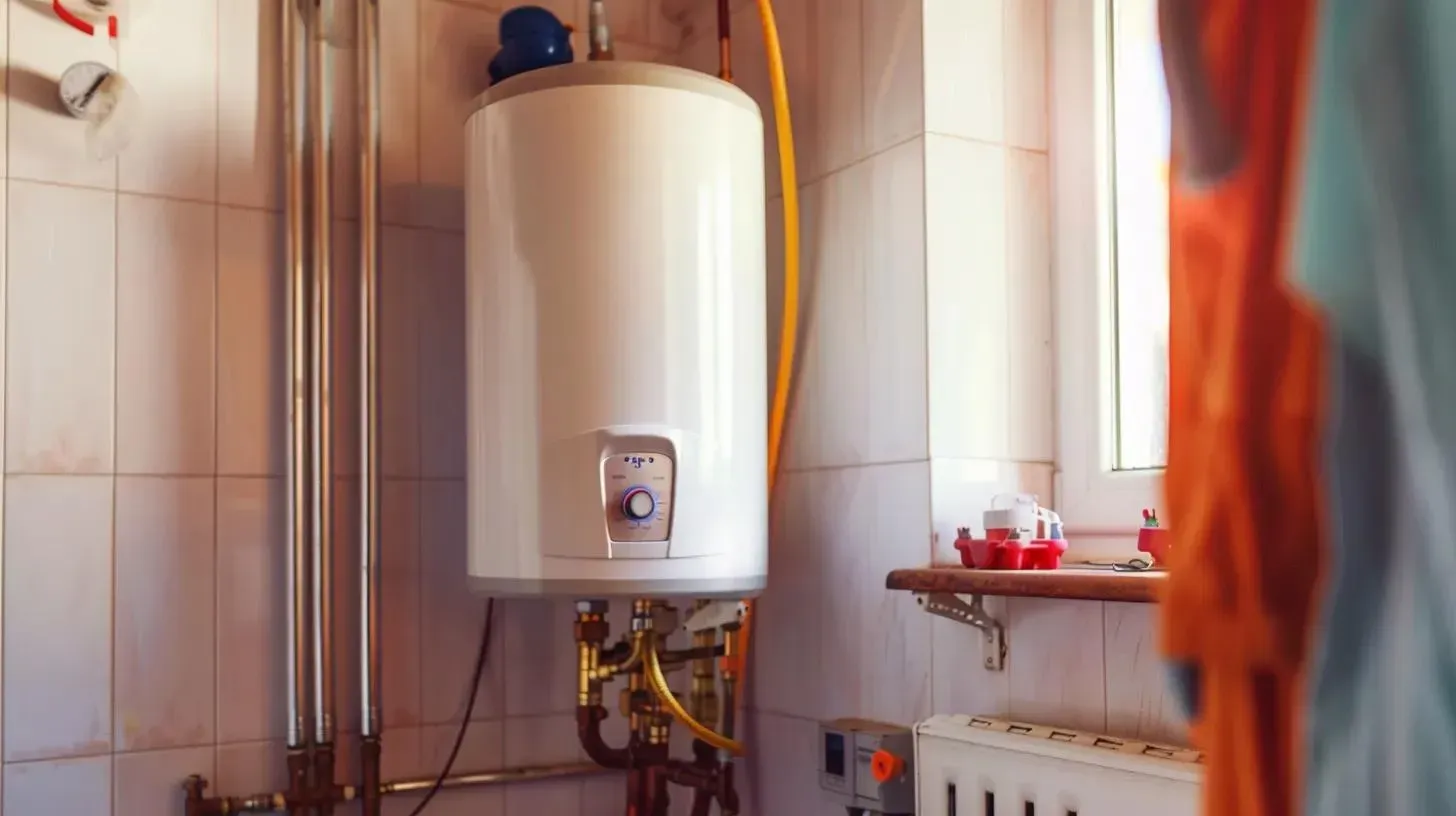Navigating Plumbing Contractor Credentials and Why They Matter
Why Plumbing Contractor Credentials Matter for Your Home
Plumbing contractors handle far more complex work than regular plumbers, but many homeowners don't know the difference. Understanding these credentials can save you thousands in repairs and protect your family's safety.
Key Differences Between Plumbers and Plumbing Contractors:
- Plumbers: Handle routine repairs, unclog drains, fix leaks
- Plumbing contractors: Design water systems, pull permits, ensure code compliance
- Licensing: Contractors need additional business licenses beyond plumbing certification
- Insurance: Contractors carry higher liability coverage for major projects
- Project Scope: Contractors oversee new construction and major renovations
When you're facing a plumbing emergency or planning a bathroom remodel, the wrong choice can lead to failed inspections, code violations, or costly repairs. Licensed contractors bring expertise that goes beyond fixing pipes - they understand local building codes, ADA compliance, and proper permitting processes.
The plumbing industry requires extensive training, with apprenticeships lasting 4-5 years and a mean annual wage of $58,360. This reflects the technical skill needed to protect your home's most critical systems.
I'm Mike Martinez, owner of Accountable Home Plumbing, and I've worked with both licensed plumbers and plumbing contractors throughout my career serving Denver families. Understanding these credentials helps you make informed decisions when your home's plumbing systems need professional attention.
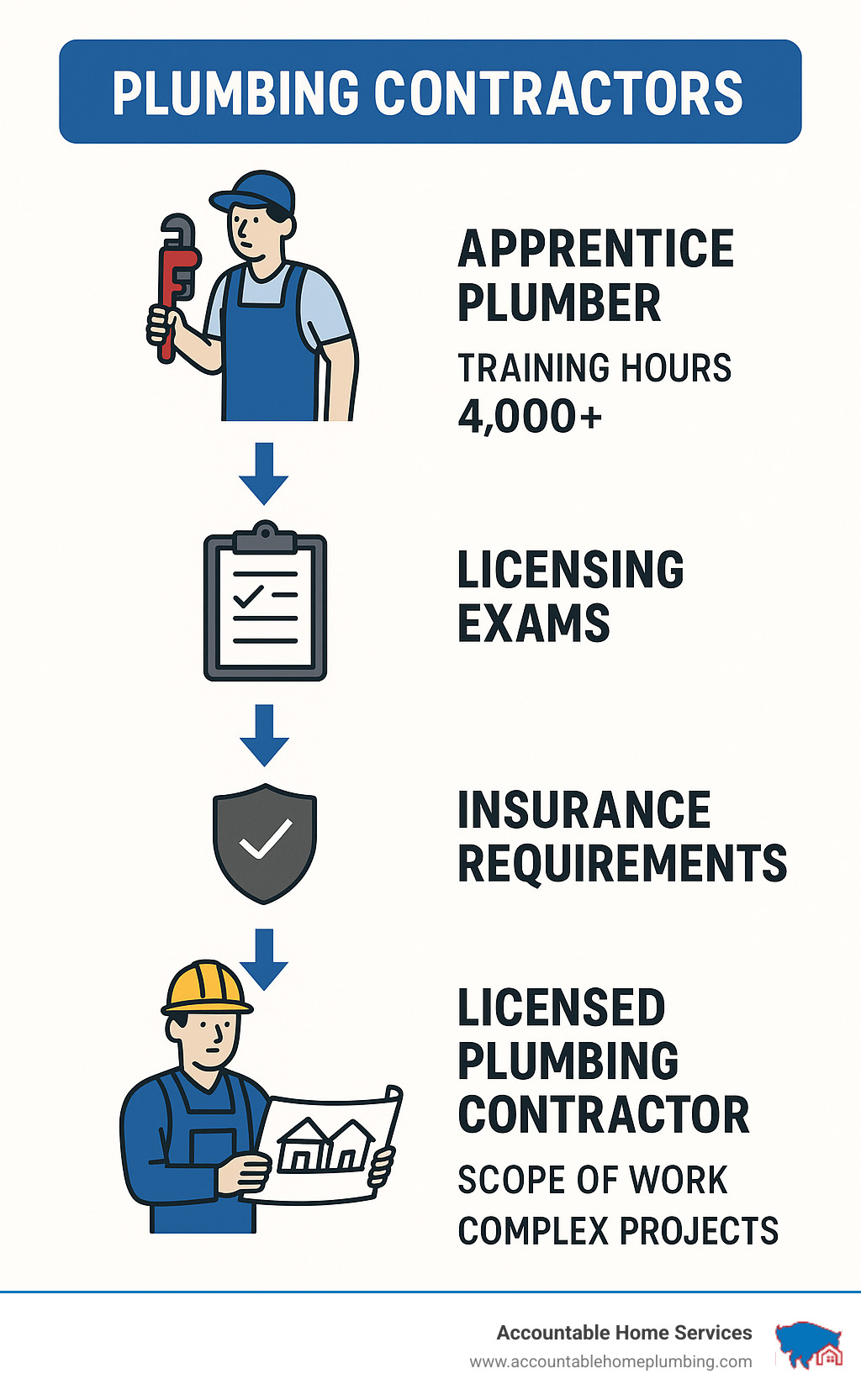
What Sets Licensed Plumbing Contractors Apart?
Plumbing contractors and regular plumbers operate in completely different leagues. While your neighborhood plumber might fix a leaky faucet or unclog a drain, contractors design entire water systems from scratch. They figure out how to get proper water pressure to every fixture in a three-story home, or how to route waste lines through complex commercial buildings.
The master license requirement tells the whole story. Getting this credential means years of additional training beyond basic plumbing certification. These are professionals who understand not just how pipes connect, but how entire building systems work together. They know local building codes inside and out, and they're legally authorized to pull permits and conduct final inspections.
Liability insurance requirements are another major difference. Contractors carry significantly higher coverage because they're working on complex projects where a mistake could flood an entire building. This isn't just paperwork - it's real protection for your property and your wallet.
The permitting process alone shows why these credentials matter. When you need a new water heater or bathroom renovation, proper permits ensure everything meets local codes. Without them, you could face serious problems when selling your home or dealing with insurance claims after water damage.
| Aspect | Regular Plumber | Licensed Plumbing Contractor |
|---|---|---|
| Typical Work | Repairs, maintenance, fixture installation | System design, new construction, major renovations |
| Permits | Cannot pull permits | Authorized to pull all necessary permits |
| Insurance | Basic liability | Higher coverage for major projects |
| Inspections | Cannot perform final inspections | Conducts final inspections and sign-offs |
| Business License | Not required | Must hold contractor's business license |
| Payment Structure | Payment on completion | Typically requires 50% deposit upfront |
Key Duties of Plumbing Contractors
Project design is where contractors really shine. When you're building a new home or doing a major renovation, they create detailed blueprints showing exactly where every pipe, valve, and fixture goes. They calculate water pressure, determine proper pipe sizes, and make sure everything flows correctly.
ADA compliance adds another layer of complexity. Commercial buildings and many residential projects must meet Americans with Disabilities Act requirements. Contractors know exactly how high to mount fixtures, how much clearance space is needed, and which grab bars meet code requirements.
Water and waste systems require careful coordination with other trades. Contractors work closely with electricians, HVAC technicians, and general contractors to make sure nothing conflicts.
Benefits of Hiring Licensed Plumbing Contractors
Quality assurance comes automatically when you work with licensed contractors. Their extensive training and continuing education requirements mean they stay current with the latest techniques and materials.
Warranty protection provides peace of mind that handyman work simply can't match. Licensed contractors typically offer comprehensive warranties covering both labor and materials.
Property value benefits from professional contractor work. Properly permitted and inspected plumbing becomes part of your home's official record, which can boost resale value. Unpermitted work can create expensive headaches when you're trying to sell.
Credential Path: From Apprentice to Master Plumbing Contractor
Becoming a licensed plumbing contractor typically takes 8-10 years of dedicated training and education. This extensive preparation reflects the complexity and responsibility involved in contractor-level work.
The path starts with apprenticeship programs that combine classroom learning with real-world experience. During this phase, future contractors learn everything from basic pipe fitting to complex system design while earning money.
After completing their apprenticeship, professionals reach the journeyman level- their first major milestone. Journeymen can work independently on most plumbing tasks, but they still can't pull permits or perform final inspections on major projects.
Master plumber certification represents the next big step up. This requires additional years of experience and more comprehensive testing. Master plumbers can supervise other professionals, design complex systems, and take full responsibility for major projects. Most states require this level of certification before someone can even apply for a contractor's license.
The contractor exam covers much more than just plumbing knowledge. It includes business law, building codes, and project management. This comprehensive testing ensures contractors understand not just how to install pipes, but how to run a business legally and ethically.
Continuing education keeps contractors sharp and current. Most states require annual training hours to maintain licenses. This ongoing education ensures professionals stay up-to-date with new safety standards, installation techniques, and emerging technologies.
The scientific research on plumbing career steps shows that contractor-level professionals typically earn well above the $58,360 mean wage for general plumbing work.
Apprenticeship & Classroom Training
The 4-5 year apprenticeship period combines approximately 2,000 hours of classroom instruction with 8,000 hours of on-the-job training. That's roughly equivalent to earning a bachelor's degree while working full-time in your chosen field.
Classroom training covers mathematics, blueprint reading, plumbing codes, and safety procedures. Students learn to calculate pipe sizes, understand hydraulic principles, and interpret complex building plans. This theoretical foundation becomes essential when designing systems for new construction or major renovations.
Many trade school partnerships supplement apprenticeship programs with specialized courses in emerging technologies. Modern plumbing increasingly involves smart home systems, high-efficiency fixtures, and computerized controls.
The on-the-job hours provide invaluable real-world experience under the watchful eye of master plumbers or licensed contractors. Apprentices start with basic tasks like pipe cutting and fitting, then gradually take on more complex work like system design and troubleshooting.
Obtaining the Contractor's License
Business and law classes prepare plumbing professionals for the parts of contractor work that have nothing to do with pipes. These courses cover contract law, lien rights, insurance requirements, and business accounting.
State exams test both technical knowledge and business understanding. The technical portion covers advanced plumbing theory, code interpretation, and system design. The business portion ensures contractors understand their legal obligations, insurance requirements, and ethical responsibilities.
Bonding requirements protect consumers by providing financial backup if contractors fail to complete work or cause damage. Most states require contractors to post bonds before receiving their licenses.
Application fees vary by state but typically range from several hundred to several thousand dollars. These fees cover background checks, exam administration, and license processing.
Staying Current With Codes & Technology
Modern plumbing contractors must master an ever-growing array of digital tools. Software tools have revolutionized how contractors design and estimate projects. Programs like Autodesk Fabrication Software allow precise modeling of complex plumbing systems before installation begins.
BIM modeling(Building Information Modeling) technology enables contractors to coordinate their work with other building trades in virtual environments. This coordination prevents conflicts between plumbing, electrical, and HVAC systems.
Quotesoft estimating programs help contractors provide consistent, professional estimates. These tools incorporate current material costs, labor rates, and local market conditions to generate accurate project pricing.
Video inspection cameras represent another technological advancement that modern contractors must master. These tools allow precise diagnosis of drain and sewer problems without destructive excavation.
Regulations, Codes, and Compliance Checklist for Plumbing Contractors
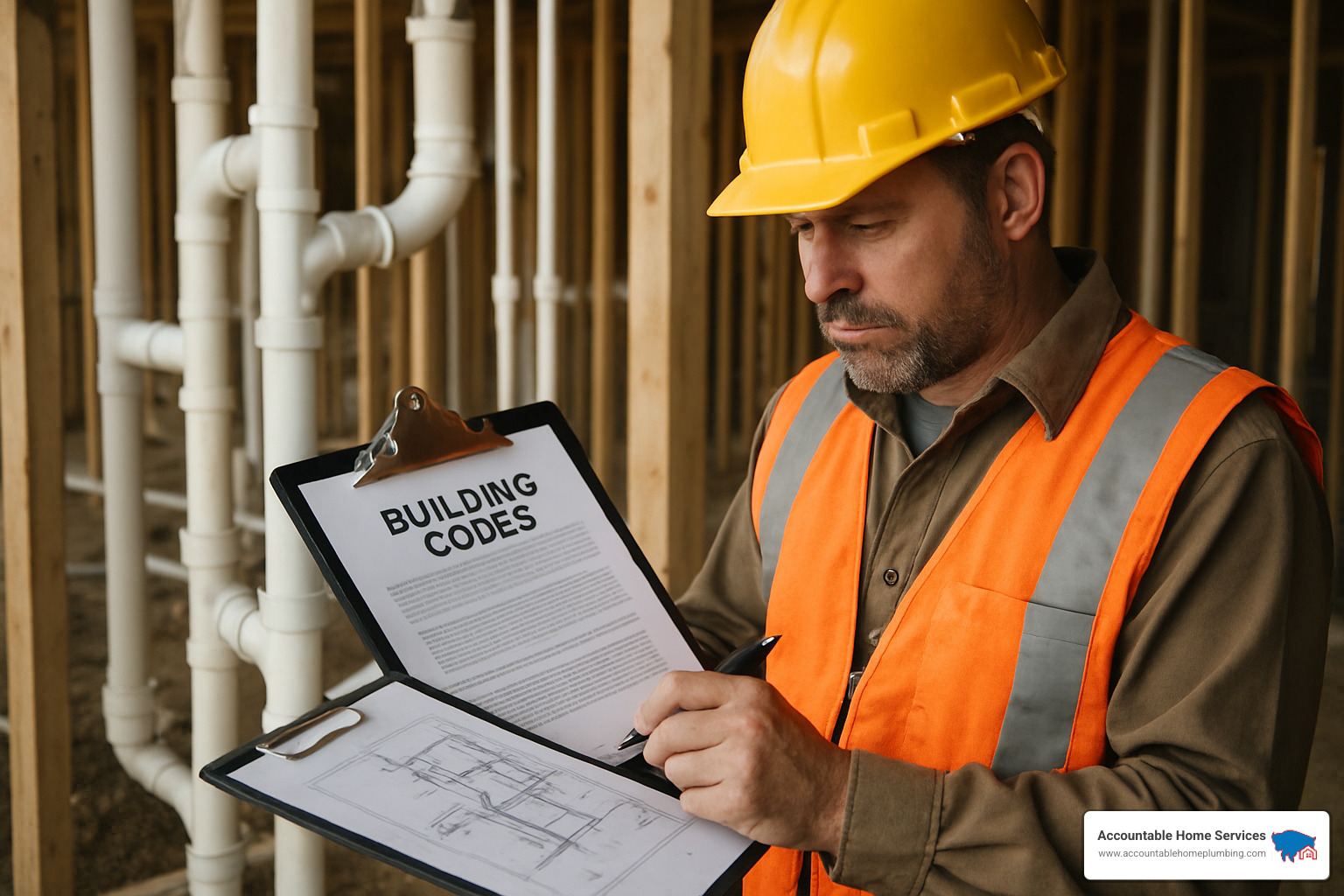
Navigating building codes feels overwhelming, but licensed plumbing contractors make this complex process look easy. They understand that proper compliance protects your family's safety and prevents expensive corrections down the road.
The International Building Code (IBC) and International Plumbing Code (IPC) serve as the foundation for plumbing regulations nationwide. However, your local city or county often adds their own amendments to address regional concerns. In Denver, for example, we deal with specific freeze protection requirements that don't apply in warmer climates.
EPA lead rules create additional compliance requirements for older homes. The Renovation, Repair, and Painting (RRP) rule kicks in whenever we work on homes built before 1978. Licensed contractors must be certified in lead-safe work practices and follow strict containment procedures.
Backflow testing might sound technical, but it's really about keeping your drinking water safe. Many areas require annual testing of backflow prevention devices, and only certified contractors can perform these tests.
The permit pull-process varies between jurisdictions, but licensed contractors know how to steer the bureaucracy efficiently. They submit detailed plans, pay the required fees, and coordinate inspection schedules.
Inspection milestones happen at specific points during your project. The rough-in inspection occurs after pipes are installed but before walls get closed up. The final inspection happens after all fixtures are connected and everything works properly.
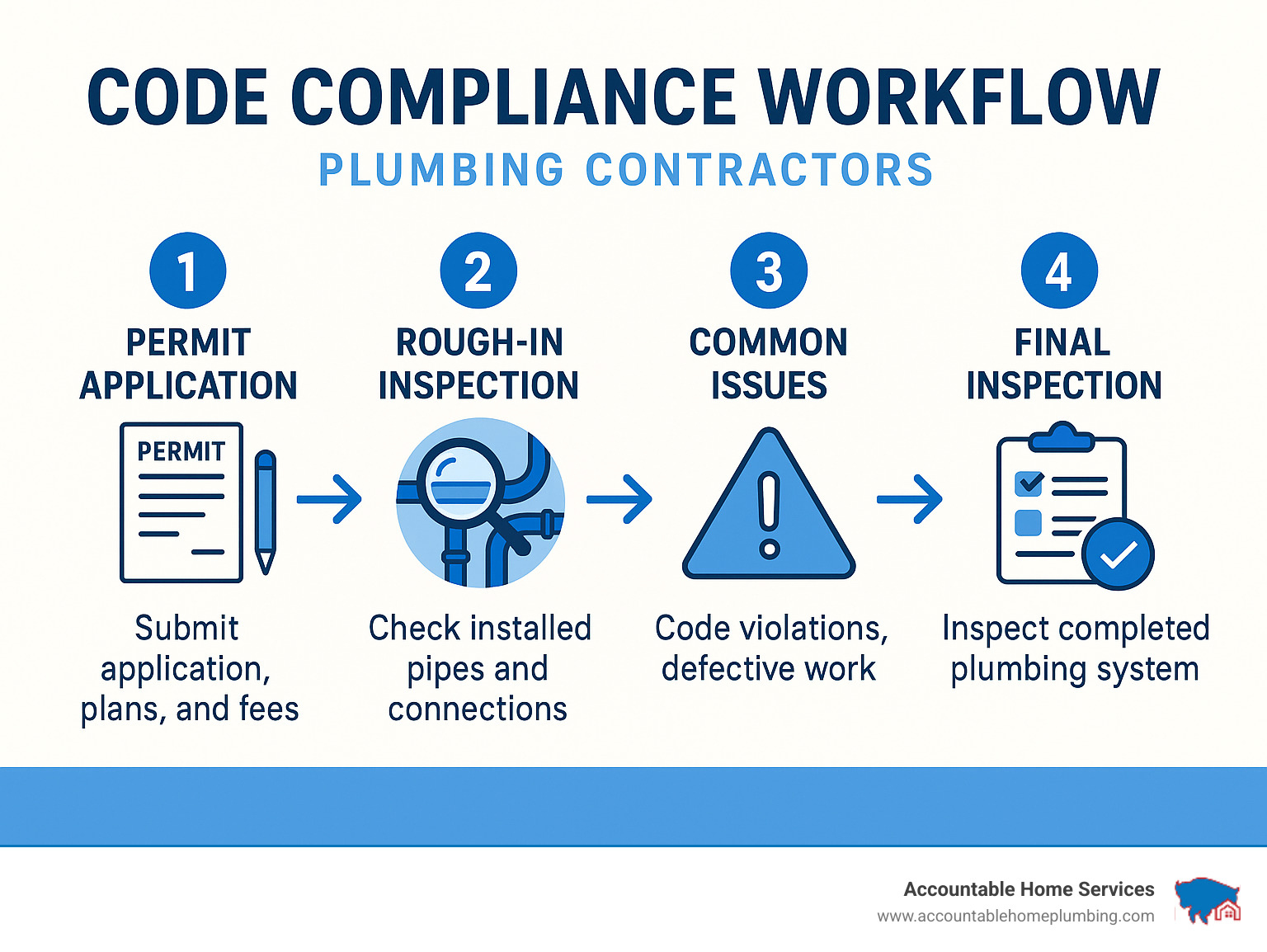
How Plumbing Contractors Ensure Pass-First Inspections
Smart contractors build relationships with local building inspectors through pre-rough walkthroughs. These informal visits happen before official inspections, giving contractors a chance to address any concerns early.
Pressure testing proves that your new plumbing system can handle normal water pressure without springing leaks. Contractors use specialized equipment to pressurize the entire system and identify any weak spots.
Document retention might seem boring, but it protects both you and your contractor. Licensed professionals keep detailed records of permits, inspections, and materials used on every project.
Common Residential & Commercial Projects Requiring Permits
Bathroom remodels typically need permits when fixtures get moved or new plumbing lines are added. Even simple projects like toilet replacements might require permits if the work involves modifying waste lines.
Water heater swaps almost always require permits, especially when upgrading from tank to tankless units or switching fuel types. These projects often involve gas line modifications, electrical work, and venting changes that inspectors need to verify for safety.
Lift stations and sewage ejector pumps require permits due to their complexity and environmental impact. These systems pump wastewater uphill to reach municipal sewer lines.
Storm drain work needs permits because these systems connect to municipal infrastructure and affect neighborhood drainage.
Estimating Costs & Structuring Payments Like a Pro
Getting a fair price for plumbing work shouldn't feel like solving a mystery. Professional plumbing contractors break down their estimates in ways that make sense, helping you understand exactly what you're paying for and why.
Labor versus materials forms the backbone of transparent pricing. Labor costs cover the actual time your contractor spends on installation, plus setup and cleanup. Material costs include everything from pipes and fittings to that beautiful new fixture you picked out.
Smart contractors build in a contingency allowance of 10-15% because plumbing projects love to surprise everyone. Maybe there's old galvanized pipe hiding behind your walls, or perhaps the previous homeowner did some "creative" repairs that need fixing.
Change orders keep everyone on the same page when plans evolve. Decided you want that rainfall showerhead after all? Change orders document these modifications and their costs upfront, so there are no surprises when the final bill arrives.
The 50% deposit standard might seem steep, but it makes sense when you think about it. Your contractor needs to buy materials and schedule their crew before work begins. This upfront payment also shows you're serious about the project.
For larger projects, milestone billing spreads payments across completion points rather than requiring everything upfront. Your bathroom remodel might have payments at rough-in completion, fixture installation, and final walkthrough.
Many contractors now offer financing options for major projects like whole-house repiping or system upgrades. These payment plans can make essential repairs more manageable for your budget. Regular maintenance can help prevent many expensive emergencies - our maintenance services help keep small issues from becoming big problems.
Reading a Professional Bid From Plumbing Contractors
A professional estimate should read like a recipe - clear ingredients and step-by-step instructions. Line-item pricing breaks everything down into specific categories like labor, materials, permits, and disposal fees.
Scope inclusions spell out exactly what work is covered in the quoted price. A good bid specifies which fixtures get installed, what type of materials will be used, and which permits are included.
Exclusions are just as important as inclusions. Professional contractors clearly list work that's not covered - things like drywall repair, painting, electrical modifications, or hauling away your old water heater.
Warranty terms show how much confidence a contractor has in their work. Look for separate warranties on labor and materials, with labor coverage often lasting longer than manufacturer warranties.
Preventing Surprise Fees
Up-front pricing eliminates guesswork by providing fixed prices for clearly defined work. You know what you'll pay before work begins, and contractors can price projects profitably based on their experience.
Written contracts protect everyone involved by documenting agreements about scope, payment terms, and completion schedules. These contracts aren't just legal protection - they're communication tools that keep projects running smoothly.
Lien releases might sound boring, but they're crucial for protecting your property. These documents ensure that suppliers and subcontractors can't come after you for payment if your contractor doesn't pay them.
Choosing & Working With Plumbing Contractors
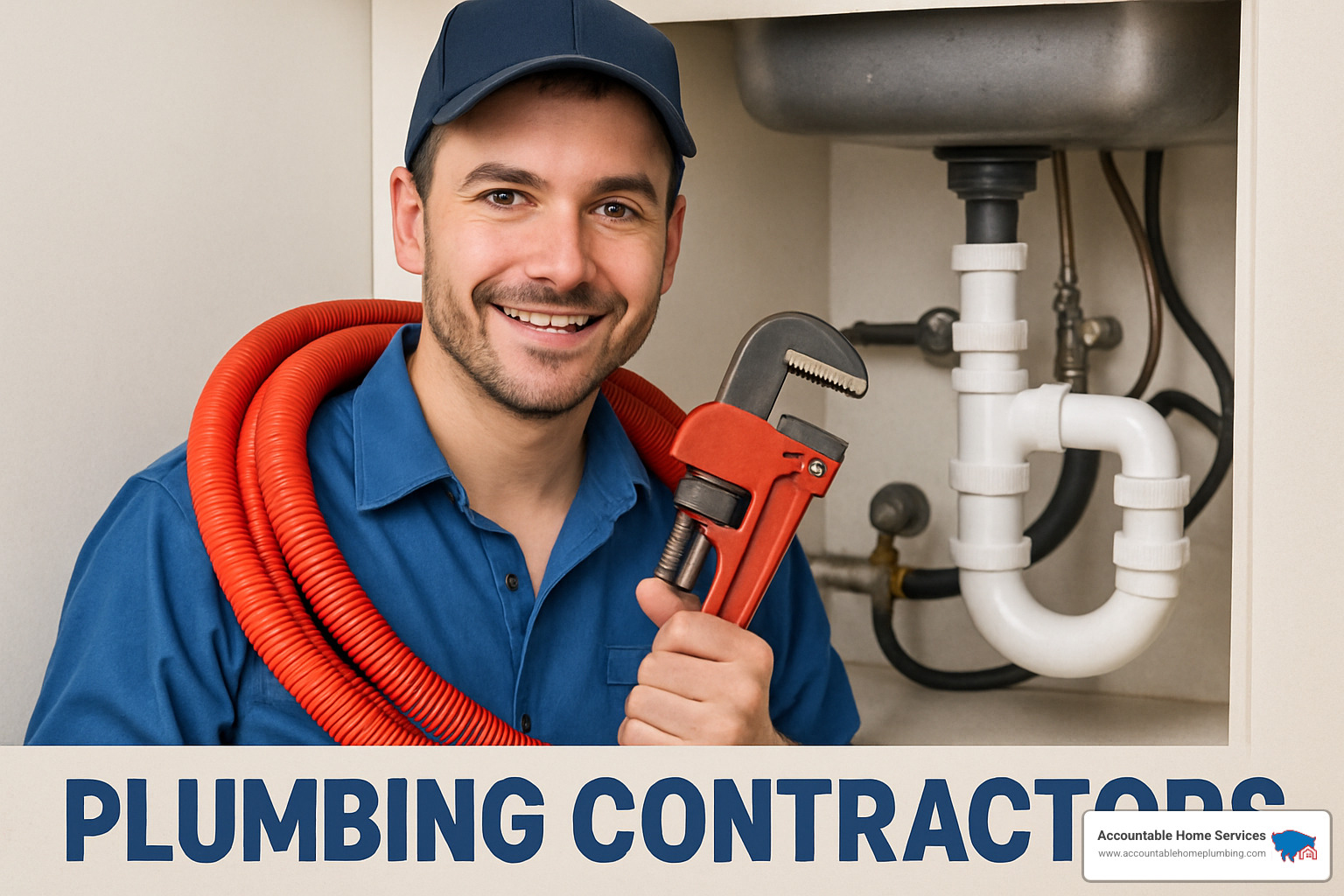
Finding the right plumbing contractors for your project doesn't have to feel overwhelming. The key is knowing what to look for and taking the time to do your homework upfront. A few hours of research now can save you thousands of dollars and countless headaches later.
Start your vetting process with the basics: license verification through your state's licensing board. Most states make this easy with online databases where you can check a contractor's license status in just a few minutes.
License lookup services reveal more than just whether someone has a valid license. You'll often find information about when their license expires, whether their bond is current, and any complaints or violations on file.
Insurance certificates should always be current and comprehensive. You want to see both general liability coverage (which protects you if they damage your property) and workers' compensation (which protects you from liability if someone gets hurt on your property).
Reviews from previous customers tell you what working with a contractor is really like. Look for patterns rather than getting hung up on individual complaints. Has the contractor consistently shown up on time? Do they clean up after themselves? Are they responsive when problems arise?
Emergency availability becomes crucial when disaster strikes at 2 AM on a Sunday. We offer true 24/7 service at Accountable Home Plumbing because we know plumbing emergencies don't wait for business hours.
If you're looking for verified professionals in your area, you can download the 2024 Plumbing Contractors List from official government sources.
Red Flags & Must-Have Qualities
No license is the biggest red flag you can encounter when hiring plumbing contractors. Unlicensed contractors can't pull permits, often lack proper insurance, and may not have the training needed for complex work.
Vague estimates that don't specify materials, timelines, or exact scope of work often signal trouble ahead. Professional contractors provide detailed estimates that break down exactly what they'll do, what materials they'll use, and how long it should take.
High-pressure sales tactics should make you run the other direction. Legitimate contractors understand that major plumbing work requires careful thought and planning.
Poor communication during the bidding process usually continues throughout the project. If a contractor doesn't return your calls promptly, shows up late for appointments, or can't clearly explain their proposed work, imagine how frustrating the actual project will be.
On the flip side, look for contractors who arrive on time for estimates, provide detailed written proposals, and take time to answer your questions thoroughly.
Leveraging Technology for Better Service
Modern plumbing contractors use technology to provide better service and keep you informed throughout your project. Online portals let you schedule service appointments, track work progress, and access project documentation through secure websites.
GPS-tracked dispatch systems help contractors provide accurate arrival times and respond faster to emergency calls. Instead of waiting around all day wondering when someone will show up, you get real-time updates about your technician's location.
Camera diagnostics represent a game-changer for drain and sewer problems. Instead of guessing what's wrong or digging up your yard to investigate, contractors can use specialized cameras to see exactly what's happening inside your pipes.
At Accountable Home Plumbing, we use these technologies to provide better service and keep our customers informed every step of the way. More info about our emergency services shows how we combine technology with old-fashioned customer service to solve your plumbing problems quickly and efficiently.
Frequently Asked Questions about Plumbing Contractor Licensing
What's the difference between a plumber and a plumbing contractor?
Think of it this way: all plumbing contractors are plumbers, but not all plumbers are contractors. The difference comes down to licensing, authority, and responsibility.
Regular plumbers handle the day-to-day work we all recognize - fixing leaky faucets, unclogging drains, and replacing worn-out fixtures. They're skilled professionals who can solve most common plumbing problems. However, they typically work under someone else's license and can't pull permits for major projects.
Plumbing contractors operate at a different level entirely. They hold additional business licenses that give them the legal authority to pull permits, design entire plumbing systems, and take full responsibility for major construction projects. When you're building a new home or completely renovating a bathroom, you need a contractor who can steer the permitting process and ensure everything meets local building codes.
The insurance requirements tell the story too. Contractors carry much higher liability coverage because they're taking on bigger risks and responsibilities. They can hire and supervise other plumbers, serve as consultants during construction, and sign off on work that affects your home's safety and value.
How much liability insurance should a plumbing contractor carry?
Most states set minimum requirements between $300,000 and $500,000 in liability coverage, but smart contractors carry much more. I always recommend looking for contractors with at least $1 million in coverage- it shows they're serious about protecting both themselves and their customers.
The size of your project matters when evaluating insurance coverage. If you're having a simple repair done, the state minimum might be adequate. But for major renovations or new construction, you want a contractor with coverage that matches the potential risk.
Don't just take their word for it - ask to see the actual insurance certificate. Make sure it's current and covers the dates when work will be performed. I've seen too many homeowners get stuck with bills because they assumed their contractor had proper coverage.
Commercial contractors working on office buildings or large residential projects often carry $2 million or more in coverage. The investment in higher insurance limits reflects their commitment to professional standards and gives you confidence they can handle whatever complications might arise.
Do I really need a permit for a water heater replacement?
This question comes up constantly, and I understand why homeowners ask it. Getting permits feels like extra hassle and expense when you just want hot water again. But the short answer is yes, you almost certainly need a permit.
Most cities and counties require permits for water heater replacements, especially when you're changing fuel types, moving the unit to a new location, or upgrading to a larger capacity. The permit process exists because water heaters involve multiple safety systems - gas connections, electrical controls, venting systems, and pressure relief valves.
Here's what really matters: unpermitted work can come back to haunt you. Insurance companies regularly deny claims for damage caused by unpermitted installations. When you sell your home, buyers' inspectors often flag unpermitted work, which can delay or kill the sale entirely.
The permit cost is usually under $100, while the potential consequences can cost thousands. Licensed plumbing contractors handle the permit process as part of their service, so you don't have to worry about the paperwork or scheduling inspections. They know the local requirements and ensure everything passes inspection the first time.
At Accountable Home Plumbing, we always pull the necessary permits for water heater installations. It's part of doing the job right and protecting our customers' investments in their homes.
Conclusion
You now have the knowledge to make smart decisions about your home's plumbing needs. Plumbing contractors bring so much more to the table than basic repairs - they're your partners in protecting your family's safety and your home's value through proper code compliance, comprehensive insurance coverage, and professional accountability.
Think of your credential checklist as your roadmap to finding the right professional. License verification, insurance confirmation, reference checking, and detailed written estimates might seem like extra work, but they're your best defense against costly mistakes. The few hours you spend vetting contractors can save you thousands down the road.
Cost transparency becomes your friend when you work with licensed professionals who believe in honest business practices. Yes, you might pay a bit more upfront compared to that guy with a truck and no license, but you're investing in proper permits, code compliance, and warranty protection that actually means something.
There's real peace of mind in having a single trusted provider who knows your home's plumbing history inside and out. At Accountable Home Plumbing, we've built our reputation on being there when Denver Metro families need us most - 24/7 service throughout Broomfield, Westminster, Thornton, Northglenn, Arvada, Boulder, Denver, and Longmont. Our upfront pricing policy means you'll never face surprise bills, and our licensed contractors ensure every job meets local codes.
Whether it's 2 AM and your water heater just flooded the basement, or you're planning that dream bathroom renovation, understanding contractor credentials puts you in the driver's seat. You can confidently choose professionals who will treat your home with the respect it deserves. More info about our full services is just a click away, where you can schedule routine maintenance or get immediate help during emergencies.
Those contractor credentials aren't just fancy certificates on the wall. They represent years of training, ongoing education, and a commitment to professional standards that directly benefit your family. When you choose wisely, your plumbing systems will keep working reliably for decades to come - and that's an investment that pays dividends every single day.

